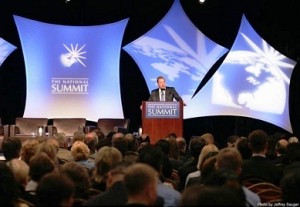
Ford came closest to raising the issue in his opening remarks: "Obviously, government involvement is a sore spot here in Detroit right now. And, for some people, any suggestion of government involvement crosses a line they believe should never be crossed."
Manufacturing is getting to be like the weather. Everybody is talking about it, but nobody is doing much to change a U.S. competitive environment that allows other countries to target industries and export their way to prosperity at the cost of U.S. jobs. To take just one example, the trade deficit with China in 2008 stood at $266.3 billion, with China imports valued at $337.8 billion compared with US exports valued at $71.5 billion, according to the US Census Bureau.
The topic has taken on new urgency as the Great Recession drags on and unemployment continues to rise to levels not seen since the Great Depression.
The U.S. is alone among industrial nations in not having some sort of high level ministry of trade that sets policy and protects home markets and industries. It is also alone in not having a national health care policy. The result is that thousands of dollars are added to the costs of manufactured goods from our runaway health care costs.
The Summit, hosted by The Detroit Economic Club, opened in Detroit with a speech by Bill Ford, executive chairman of Ford M0tor Company and co-host of the event. Ford came closest to raising the industrial policy issue in his opening remarks.
“Obviously, government involvement is a sore spot here in Detroit right now,” Ford said. “And, for some people, any suggestion of government involvement crosses a line they believe should never be crossed. But in Detroit, we have seen first hand that having no policy is a policy choice in itself — and a bad one. We need policies that define where we want to go as a society, and that help us get there — an industrial policy and an energy policy, to name two urgent examples,” he said.
However, notably absent from the summit were senior government officials, who could actually implement such policies.

"A competitive, prosperous America, however you define it, includes a competitive manufacturing base."
Andrew Liveris, Chairman and CEO, The Dow Chemical Company and other host, added, “A competitive, prosperous America — however you define it — includes a competitive manufacturing base,” Liveris said. “A competitive and prosperous America includes a more competitive educational system. It includes a technology and R&D sector that is second-to-none. It includes integrated environmental policies that encourage sustainability, that protect our earth and that safeguard our neighbors. And, as I’ve said many times, it includes an energy policy that delivers a stable and secure supply for us to grow on.”
Panelists at the Manufacturing Competitiveness Town Hall that was part of the Summit called for government actions to increase research and development and cut costs, but they mostly danced around the core issue of the lack of an U.S. industrial policy by repeating the same old nostrums.

"The future of manufacturing must rely on advancing through innovation, exploration and commercialization."
“Prosperity comes from building, creating and producing,” said Chip McClure, CEO of ArvinMeritor, later in the day. “Tough choices must be made to create a pro-industry climate with policies on trade, taxes, energy, health care, and education that make it competitive for U.S. and foreign manufacturers to build here. An economic downturn is not the time to walk away from 12 million American manufacturing jobs.”
Even in the current downturn, the U.S. remains the world’s largest goods producing nation, accounting for almost 20% of global manufacturing output. But while the U.S. Federal government is taking strong and expensive steps to stimulate our market, European and Asia nations are reluctant to embark on deficit spending to increase the demand in their markets. Thus the whole concept of global trade is under attack from critics, who point out that protectionism is on the increase, and the markets of Korea and China, two of the largest exporters to the U.S., remain closed to American-made goods.
In 2007, according John Engler, president of the National Association of Manufacturers, manufacturing represented $1.6 trillion of what was then a roughly $13 trillion economy before it was decimated by the fraudulent practices of American Finance Capitalism, which was responsible for the global financial collapse.
Engler espoused the usual Republican position that taxes must be cut. “Every action the Federal government takes to impose new burdens and add new costs makes it more difficult for manufacturers to create jobs and compete in a global economy,” Engler said.
One of the largest burdens imposed on the economy is the national debt that soared under the Bush administration as he cut taxes and started a trillion dollar war. This wiped out the surplus built under the Clinton administration. A majority of taxes now collected go to service this debt. To be fair, politicians from both parties show very little interest in funding the programs they pass.
